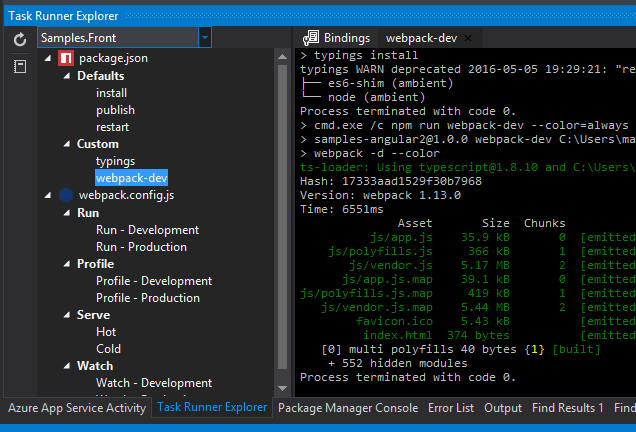This series sample will convert the Tour of heroes sample application from angular.io.
This part will add webpack support to our samples, to replace grunt.
Prerequisites
The following two visual studio extensions will make our lifes easier :
- NPM task runner for running NPM scripts from task runner explorer
- Webpack task runner for running webpack fron task runner explorer

Webpack installation
A nice introduction for this new fancy Webpack thing was made by Burke Holland from Telerik. Have a look at it, I’ll be waiting for you here!
Now, we can start writing some config and code !
First of all, we’ll need to update the package.json file :
"dependencies": {
"angular2": "2.0.0-beta.15",
"es6-shim": "^0.35.0",
"reflect-metadata": "0.1.2",
"rxjs": "5.0.0-beta.2",
"zone.js": "0.6.11"
},
"devDependencies": {
"webpack": "^1.12.13",
"copy-webpack-plugin": "^1.1.1",
"css-loader": "^0.23.0",
"file-loader": "^0.8.4",
"html-loader": "^0.4.0",
"raw-loader": "0.5.1",
"style-loader": "^0.13.0",
"ts-loader": "^0.8.1",
"typescript": "^1.8.0",
"typings": "^0.7.12"
},
Webpack configuration
All configuration is done through a javascript file named … webpack.conf.js. The base concept is that webpack will discover your code, from one or more entry points:
config.entry = {
'polyfills': ['core-js/client/core', 'angular2/bundles/angular2-polyfills'],
'vendor': './src/vendor.ts',
'app': './src/main.ts' // our angular app
};
From there, loaders will transform your code:
loaders: [
// Reference: https://github.com/TypeStrong/ts-loader
// -> ts compilation
{
test: /\.ts$/,
loader: 'ts'
},
// Reference: https://github.com/webpack/css-loader
// -> will resolve imports and requires in css
// Reference: https://github.com/webpack/style-loader
// -> will load the css into the page
{
test: /\.css$/,
// all files in css folder
include: path.join(sourcesRoot, 'src/css'),
loader: 'style!css'
},
// Reference: https://github.com/webpack/raw-loader
{
test: /\.css$/,
// all files in app folder will get inlined
include: path.join(sourcesRoot, 'src/app'),
loader: 'raw'
},
// https://github.com/webpack/raw-loader
{
test: /\.html$/,
loader: 'raw'
}
]
And produce an output :
config.output = {
path: path.join(sourcesRoot, 'wwwroot'),
filename: 'js/[name].js'
};
Typings
This one is mandatory for referencing libraries from your code, and having compilation working smoothly. Setup is straightforward : create a typings.json file, and run
typings install
Using package.json, this can go into a script, and we can put webpack there as well :
"scripts": {
"typings": "typings install",
"webpack-dev": "webpack -d --color"
},
Updating the code
A few updates are required, add a vendor.ts file to reference external libraries entry points :
// Angular 2
import 'angular2/platform/browser';
import 'angular2/platform/common_dom';
import 'angular2/core';
import 'angular2/router';
import 'angular2/http';
// RxJS
import 'rxjs';
Replace templateUrls and styleUrls, as for the moment, we’re going to let webpack inline the templates and the styles:
// from:
templateUrl: 'hero-detail.component.html',
styleUrls: ['hero-detail.component.css'],
// to:
template: require('./hero-detail.component.html'),
styles: [require('./hero-detail.component.css')],
Weird issue : templates loaded as urls ?!
In the following exception, it looks like the template used for one component acts as an URL :
GET http://localhost:53792/%3Ch1%3E%7B%7Btitle%7D%7D%3C/h1%3E%0D%0A%0D%0A%0D%0A 400 (Bad Request)
EXCEPTION: Failed to load %3Ch1%3E%7B%7Btitle%7D%7D%3C/h1%3E%0D%0A%0D%0A%0D%0A
EXCEPTION: Failed to load %3Ch1%3E%7B%7Btitle%7D%7D%3C/h1%3E%0D%0A%0D%0A%0D%0A
EXCEPTION: Error: Uncaught (in promise): Failed to load %3Ch1%3E%7B%7Btitle%7D%7D%3C/h1%3E%0D%0A%0D%0A%0D%0A
EXCEPTION: Error: Uncaught (in promise): Failed to load %3Ch1%3E%7B%7Btitle%7D%7D%3C/h1%3E%0D%0A%0D%0A%0D%0A
STACKTRACE:
Error: Uncaught (in promise): Failed to load %3Ch1%3E%7B%7Btitle%7D%7D%3C/h1%3E%0D%0A%0D%0A%0D%0A
at resolvePromise (angular2-polyfills.js:602)
at angular2-polyfills.js:638
at ZoneDelegate.invokeTask (angular2-polyfills.js:423)
at Object.NgZoneImpl.inner.inner.fork.onInvokeTask (ng_zone_impl.js:36)
at ZoneDelegate.invokeTask (angular2-polyfills.js:422)
at Zone.runTask (angular2-polyfills.js:320)
at drainMicroTaskQueue (angular2-polyfills.js:541)
at XMLHttpRequest.ZoneTask.invoke (angular2-polyfills.js:493)
Unhandled Promise rejection: Failed to load %3Ch1%3E%7B%7Btitle%7D%7D%3C/h1%3E%0D%0A%0D%0A%0D%0A ; Zone: angular ; Task: Promise.then ; Value: Failed to load %3Ch1%3E%7B%7Btitle%7D%7D%3C/h1%3E%0D%0A%0D%0A%0D%0A
Error: Uncaught (in promise): Failed to load %3Ch1%3E%7B%7Btitle%7D%7D%3C/h1%3E%0D%0A%0D%0A%0D%0A(…)
Unhandled Promise rejection: Failed to load %3Ch1%3E%7B%7Btitle%7D%7D%3C/h1%3E%0D%0A%0D%0A%0D%0A ; Zone: <root> ; Task: Promise.then ; Value: Failed to load %3Ch1%3E%7B%7Btitle%7D%7D%3C/h1%3E%0D%0A%0D%0A%0D%0A
Error: Uncaught (in promise): Failed to load %3Ch1%3E%7B%7Btitle%7D%7D%3C/h1%3E%0D%0A%0D%0A%0D%0A(…)
After a LOT of head scratching and banging, the issue was simply that :
@Component({
selector: 'dashboard',
templateUrl: require('./dashboard.component.html'),
styleUrls: [require('./dashboard.component.css')]
})
needs to be changed with :
@Component({
selector: 'dashboard',
template: require('./dashboard.component.html'),
styles: [require('./dashboard.component.css')]
})
Otherwise, the template would be … the url…
Special thanks
A lot of this setup and configuration was made possible thanks to angular2-webpack repository, thanks to them for the hard work put into their repo, which contains a lot more interesting stuff to see!
The source repository for this article is on Github.